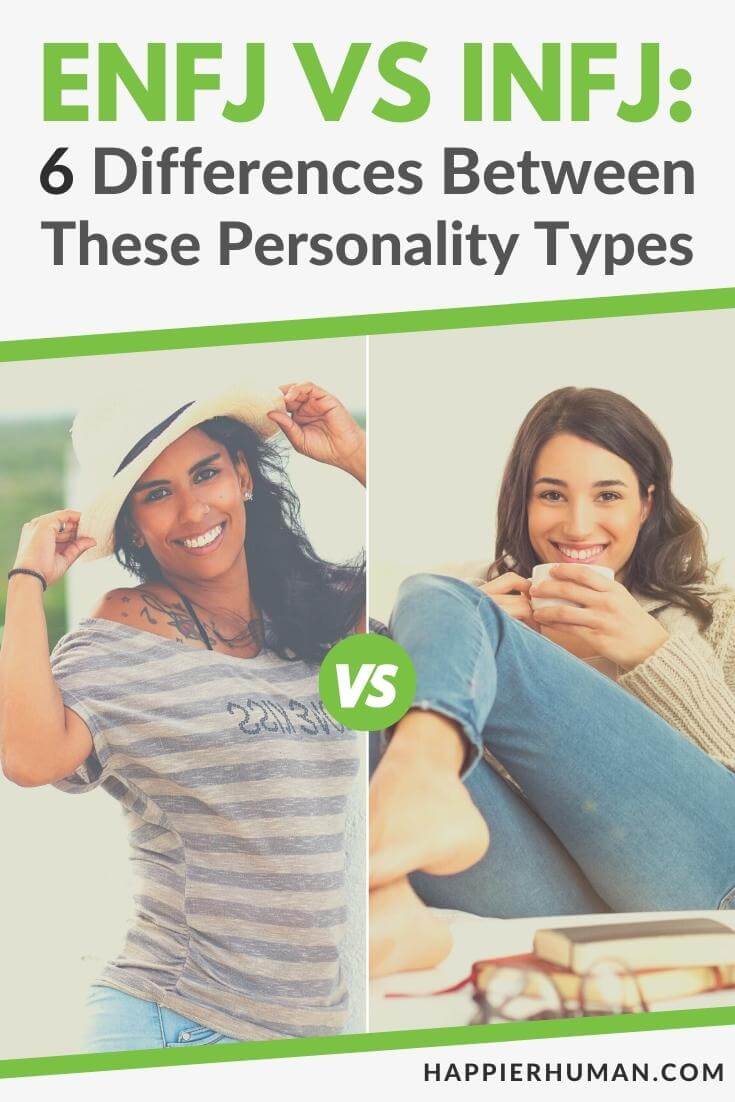At first glance, it may seem that introversion and extroversion is the only difference between the ENFJ and INFJ personalities.
However, introversion or extroversion preferences can create enormous differences in how a person lives, works, and interacts with the world around them. Therefore, let’s examine the surprising differences between ENFJ and INFJ personalities.
What Is the ENFJ Personality Type?
The ENFJ personality is known as the Protagonist, a personality motivated by an idealistic vision to help others and achieve a greater purpose in life. The key attributes of an ENFJ are:
Extroverted
The first preference indicates where a person tends to direct and receive their energy. Extroverts prefer to channel their energy outward toward people, activities, and sensations in the external world.
Extroverts are energized by activity and interactions with others. They discover their ideas and beliefs through their behaviors and sometimes act without planning.
INtuiting
The second psychological preference indicates the way a person prefers to receive information. An intuiting person pays more attention to information patterns, impressions, and underlying meaning. They learn by thinking things through and exploring the implications of new information. They mentally explore symbols, theories, and abstractions and remember ideas and concepts better than factual details.
Feeling. The third preference indicates the way a person prefers to make decisions. A feeling person makes decisions by considering the perspectives and opinions of everyone involved and trying to create a harmonious outcome.
They want to deeply understand the feelings of the people around them and reach a peaceful resolution. They know that no two different situations will have the same solution because other people and different feelings will be involved.
Judging. The final preference indicator refers to how a person deals with the outside world. A person with a judging personality prefers a structured life, concrete plans, and firm decisions. They make step-by-step plans, keep to-do lists and schedules, and exercise control over their life and time.
The Protagonist is a born leader with a passion and charisma that attracts the attention and affection of others. They are vocal about defending their values but act with warmth and sensitivity that wins friends rather than starts fights.
They are persuasive, inspiring, and authentic. The ENFJ can make friends and bridge gaps between all personality types, and they are loyal and devoted friends. Their ability to plan and follow through makes them even more powerful leaders, and ENFJs make excellent teachers, coaches, and community organizers.
What Is the INFJ Personality Type?
The INFJ personality type is known as the Advocate, a personality type full of contradictions. Their key characteristics are:
Introverted
The first preference indicates where a person tends to direct and receive their energy. Introverts prefer to channel their energy inward toward ideas, information, and beliefs.
Introverts prefer doing things alone or with just one or two people they know and trust. They usually think and plan before they act or speak and sometimes like the idea of something better than the thing itself.
Intuiting
The second psychological preference indicates the way a person prefers to receive information. An intuiting person pays more attention to information patterns, impressions, and underlying meaning.

They learn by thinking things through and exploring the implications of new information. They mentally explore symbols, theories, and abstractions and remember ideas and concepts better than factual details.
Feeling
The third preference indicates the way a person prefers to make decisions. A feeling person makes decisions by considering the perspectives and opinions of everyone involved and trying to create a harmonious outcome.
They want to deeply understand the feelings of the people around them and reach a peaceful resolution. They know that no two different situations will have the same solution because other people and different feelings will be involved.
Judging
The final preference indicator refers to how a person deals with the outside world. For example, a person with a judging personality prefers a structured life, concrete plans, and firm decisions. They make step-by-step plans, keep to-do lists and schedules, and exercise control over their life and time.
The Advocate is thoughtful, imaginative, and has high principles in life. They tend to be guided by an inner vision that makes them independent of others and willing to go their own way to pursue their values.
Although their sense of values and purpose is exceptionally high and uncompromising, they are often relaxed and easygoing with others. They balance creativity with analysis, logic with emotion, and quiet sensitivity with extremely high standards.
What Do ENFJ and INFJ Personalities Have in Common?
ENFJ and INFJ personalities have quite a lot in common, and there are many ways in which they resemble each other. However, the key characteristics that ENFJ and INFJ personalities share are:
1. Strong Values
ENFJ and INFJ personality types have very strong values and high principles. They believe in working to make the world a better place and have an idealistic vision of the future. You will likely find both types working on social causes, helping others, and being good citizens.
2. Creativity
Both personality types are imaginative and creative. Their orientation toward the future, and natural optimism, help them imagine ways that things could be different and better, and they back these ideas up with the discipline to make them happen. They are resourceful and inventive personality types.
3. Over-Sensitivity
ENFJ and INFJ personalities are emotionally sensitive, although that sensitivity can be expressed differently. For example, the extroverted ENFJ often tries to seek approval and reassurance when their feelings are hurt. At the same time, an introverted INFJ can withdraw and refuse to engage with painful feelings.
Considering how ENFJs Oprah Winfrey and Bernie Sanders seek to make significant changes to improve the world, compared with INFJs Princess Diana and Eleanor Roosevelt, many of these common characteristics become more apparent.
6 Key Differences Between the ENFJ and INFJ Personality
Despite these similarities and the tendency to share the same values, ENFJ and INFJ personality types also have huge differences. The key differences between these types are:
1. Personality Type Frequency
ENFJ: 2-5% overall. INFJ: 1-3% overall
INFJ is an extremely rare personality type, especially among men. Only an estimated 1-2% of American men are INFJ types.
2. Outgoing vs. Quiet
Outgoing: ENFJ. Naturally, as an extrovert, the ENFJ will be more outgoing. They are more likely to enjoy very active environments with many people and enjoy meeting new people as much as they enjoy reconnecting with existing friends. ENFJs are warm and sociable and prefer environments with lots of socializing and activity.
Quiet: INFJ. And the naturally introverted INFJ is quieter and more reserved. A typical INFJ is comfortable spending time alone and doesn’t often seek out social environments.
They are more comfortable doing things with a few people they know well, and it can be difficult for new people to get to know. They are also more likely to want to engage in quiet social activities and not seek out as much action.
3. Selfless vs. Reserved
Selfless: ENFJ. The ENFJ’s desire to get along with others and their willingness to help people and do the right thing can make them incredibly supportive and helpful to those around them. In fact, they can be so helpful and selfless that they can sometimes struggle to set or observe healthy boundaries.
Reserved: INFJ. INFJ personalities are more independent and less socially invested. While they want to help others and improve the world, they also hold back and don’t jump on board with every opportunity. This can make them seem cold and uncaring when it’s often just natural restraint.
4. People-Pleaser vs. Perfectionist
People-pleaser: ENFJ. The ENFJ cares about promoting harmony and good feelings, which can make them too much of a people pleaser. So not only may they avoid conflict and confrontation, even when it’s healthy, but they may avoid being candid when they think it may hurt someone’s feelings.

Perfectionist: INFJ. An INFJ has high values and standards for themselves and others. This can make them perfectionists, always finding flaws and imagining how things could be better. Their direct communication style can sometimes come across as unnecessarily critical and rude.
5. Receptive vs. Defensive
Receptive: ENFJ. An ENFJ usually has more sophisticated communication skills and a genuine desire to hear and understand the opinion of others. While they have difficulty giving criticism, they can be very receptive and open-minded about feedback, even when it’s negative. In addition, they are open to new opinions, new approaches, and new ideas.
Defensive: INFJ. While the INFJ is always interested in new information that helps them make positive changes, they are not as skilled at taking criticism and being receptive to negative feedback.
Their independence can make them stubborn; if their feelings are hurt, they can cling to their own point of view and react defensively to feedback from others.
6. Indecisive vs. Decisive
Indecisive: ENFJ. As a consequence of their desire to create harmony and work toward situations where everyone is happy, an ENFJ can be indecisive, especially in challenging situations with no happy, harmonious solution.
In addition, the desire to make everyone happy and avoid conflict can make an ENFJ avoid making decisions and interfere with their natural leadership abilities.
Decisive: INFJ. Because the INFJ isn’t as deeply concerned with social harmony and happiness and is committed to their ideas and values, it is easier for them to be decisive and make tough calls. They believe their vision and principles are right and pursue them with determination.
The most significant difference between ENFJ vs. INFJ personalities is that an ENFJ has social skills that make it easier to communicate with others, allowing them to better understand and be understood.
On the other hand, the natural reserve of an INFJ can make it more difficult for them to explain their vision and principles to other people and more difficult for them to express their feelings.
Final Thoughts on ENFJ and INFJ Personalities
ENFJ and INFJ are outstanding personalities, driven to improve the world and help the people around them. Their high principles and idealism are backed up by the ability to plan and persevere to realize their goals, and we all benefit from having these people in the world.
When learning about the 16 personality types and how they interact in the world, it’s important to remember that these tests only measure a person’s habits and preferences and not the full range of their abilities. Nearly everyone is capable of the full breadth of skills and abilities; it’s just that certain skills come more easily and are practiced more often by some people.
In addition, a person’s personality type doesn’t define everything they are capable of, and their preferences may change over time. For example, if someone is introverted as a young person due to a lack of confidence and social opportunities, that may change over time as they build confidence and find a social group that expands their horizons.
The value of the Myers-Briggs personality type is that it helps you better understand the people around you and gives a framework for improved communication and cooperation between different types. These tools build more harmonious homes and workplaces, and it’s worth trying today.
Finally, if you want to identify YOUR personality type, then take one of these 11 personality tests to better understand what makes you tick.


